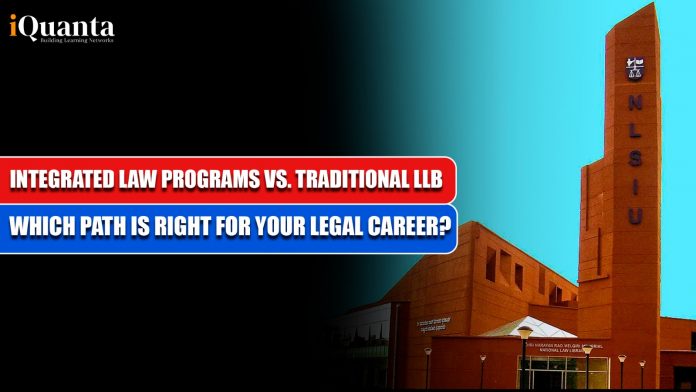The evolution of the legal profession has taken a radical turn and has now created a need for multidisciplinary and much deeper legal education. In general education, law used to be undertaken as a second professional qualification after a first degree. Today, however, law has changed from being an add-on to that degree program into an integrated program, combining both undergraduate with law studies into one course.
For future legal career aspirants wanting to decide between choosing a traditional three-year LLB course and going for an integrated five-year program-a choice that significantly affects how one carries out their academic experience, what skills one develops and, generally, the future one’s career path. This article therefore is a guide to considering both pathways while distinguishing their structures, merits, demerits, and major differences. By the end of it, you will have an informed decision on the pathway that aligns best with your career goal.

The Traditional LLB Course: A Legal Education Worth It
The structure and curriculum
A so-called traditional LLB program is a three-year program that the students take for earning a degree after graduation in any stream. It basically covers the principal areas of law, such as:
- Constitutional Law
- Criminal Law
- Contract Law
- Jurisprudence
- Company Law
The course also strengthens theoretical understandings and legal reasoning with things like moot courts, internships, and legal research.
The Benefits of a Traditional LLB
- Specialized learning: The learners will pay undivided attention to legal topics, and no classes on non-legal subjects will disturb the student’s schedule.
- Freedom: Since this degree has to be preceded by some undergraduate education, students can afford to go astray before settling down to law.
- Established Route: For three years, the LLB serves as an internationally recognized route to becoming a lawyer in common law countries such as India, UK, and others.
- Mature Learning Approach: Students enter the program after college education and are expected to hold a more mature perspective on legal concepts and their applications.
Disadvantages of Traditional LLB
- Time Consuming: it takes way longer than a degree from a traditional LLB for one to complete Legal Education; it takes a minimum of 6 years.
- Limited Interdisciplinary Exposure: completely legal syllabus; very little in the way of business, technology, or social science.
- Competitive Entry Post-Graduation: Graduates of a law program offered through a traditional LLB stand to contend against integrated law graduates who commenced their professional pursuits two years ahead.
Integrated Law Programs: All in One Approach
Curriculum and Structure
Integrated law programs incorporate an undergraduate degree with legal education into a total of five years. Here are the combinations available:
- BA LLB (Arts + Law): It includes political science, sociology, and history, among other human sciences.
- BBA LLB (Business + Law): It comprises management, finance, and business administration subjects.
- BCom LLB (Commerce + Law): Accounting, taxation, and business law are included.
- BSc LLB (Science + Law): Such as biotechnology, environmental law, and forensic science are included.
- BTech LLB (Technology + Law): Such as cybersecurity and intellectual property rights are legal subjects related to the technology field.
All these programs harmonize the non-legal subjects with the core laws of a particular one and thus give an all-rounded view of the legal applications.
Integrated Law Courses Make the Following Benefits:
- Saves on Time: An undergraduate degree combined with a law degree allows students to save an entire year from an earlier route.
- Interdisciplinary Learning: An additional qualification in another subject area makes the graduates more versatile and employable.
- Improved Employment Opportunities: Employers tend to prefer candidates with some interdisciplinary knowledge, which is the case with most areas of corporate law and intellectual property.
- Early Legal Exposure: They start learning law in the first year itself so that it becomes easy for them to have a proper base much earlier than those studying for an LLB the traditional way.
Disadvantages of Integrated Law Programs
- Less Freedom: Because the students have to commit to law right after high school, they are restricted in their options to explore other disciplines.
- Comprehensive but Shallow: Although it encompasses several subjects, it does not allow as intense a specialization in law as does the traditional LLB curriculum.
- Load Hard: Managing both law and non-legal subjects can be a challenging job indeed.
Key Differences: Comparative Overview
| Feature | Traditional LLB | Integrated Law Program |
| Duration | 3 years (after undergraduate degree) | 5 years |
| Focus | Core legal subjects | Interdisciplinary approach |
| Curriculum | Legal subjects only | Combination of law + non-law subjects |
| Time Efficiency | Requires at least six years | Saves one year |
| Interdisciplinary Exposure | Limited | Extensive |
| Career Prospects | Strong foundation in law | Diverse career opportunities |
| Flexibility | More flexible | Less flexible |
Making the Right Choice: Important Things to Consider
1. Career Ambitions
- If you are focused purely on law as a profession, considering the traditional LLB may be the best.
- In case professional mobility is what you are looking for, then an integrated program may suit your choices better.
2. Learning Orientation
- LLB would seem the best option if your interests lie only in legal studies.
- However, for one who appreciates an interdisciplinary concept, an integrated law program would suit better.
3. Duration of Study
- If you wish to join the profession earlier, go for integrated five-year.

Integrated Law Programs vs. Traditional LLB – FAQs
Yes, an LLM course is available for graduates of integrated law programs. They are in no way different from traditional LLB graduates in this regard.
BBA LLB is considered preferable with respect to corporate law-specifically in the context of BBA LLB as curriculum focuses much on business.
Most law firms will go with integrated graduates rather than traditional LLB degree holders because of the diversity in academic exposure.
Yes, but it depends on what specialization is considered opening for the student (example: by taking a BSc law and subsequently allowing him/her to get into options like environmental law).
It is not, and it is a good option for people who just want to study law after they have done some other undergraduate course.
They can be much harder because they are inter-disciplinary.
Both have their own merits but a traditional LLB may give you a little more edge for that specialized in law related to judiciary exams.
Yes, many of them do provide scholarship programs for such courses based on merit or need.
Well, it depends on the field, but having an interdisciplinary background can lead to higher income in certain specialized jobs.
The only disadvantage is the absence of flexibility regarding choice over the undergraduate subject later.

